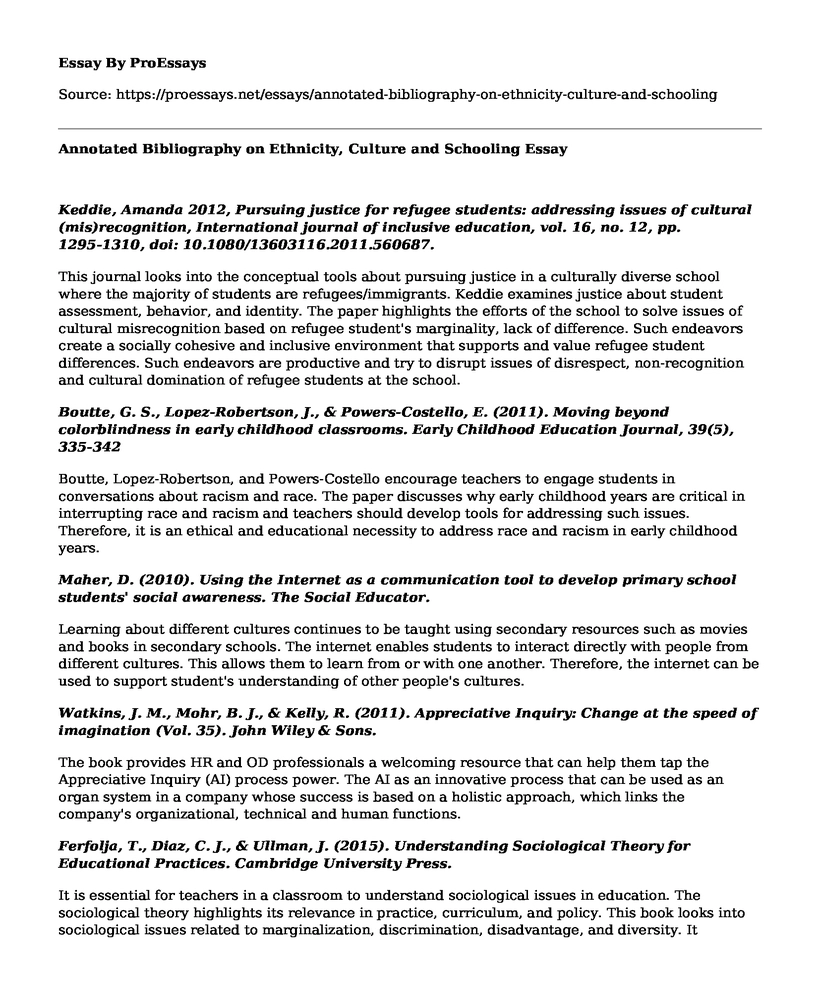Keddie, Amanda 2012, Pursuing justice for refugee students: addressing issues of cultural (mis)recognition, International journal of inclusive education, vol. 16, no. 12, pp. 1295-1310, doi: 10.1080/13603116.2011.560687.
This journal looks into the conceptual tools about pursuing justice in a culturally diverse school where the majority of students are refugees/immigrants. Keddie examines justice about student assessment, behavior, and identity. The paper highlights the efforts of the school to solve issues of cultural misrecognition based on refugee student's marginality, lack of difference. Such endeavors create a socially cohesive and inclusive environment that supports and value refugee student differences. Such endeavors are productive and try to disrupt issues of disrespect, non-recognition and cultural domination of refugee students at the school.
Boutte, G. S., Lopez-Robertson, J., & Powers-Costello, E. (2011). Moving beyond colorblindness in early childhood classrooms. Early Childhood Education Journal, 39(5), 335-342
Boutte, Lopez-Robertson, and Powers-Costello encourage teachers to engage students in conversations about racism and race. The paper discusses why early childhood years are critical in interrupting race and racism and teachers should develop tools for addressing such issues. Therefore, it is an ethical and educational necessity to address race and racism in early childhood years.
Maher, D. (2010). Using the Internet as a communication tool to develop primary school students' social awareness. The Social Educator.
Learning about different cultures continues to be taught using secondary resources such as movies and books in secondary schools. The internet enables students to interact directly with people from different cultures. This allows them to learn from or with one another. Therefore, the internet can be used to support student's understanding of other people's cultures.
Watkins, J. M., Mohr, B. J., & Kelly, R. (2011). Appreciative Inquiry: Change at the speed of imagination (Vol. 35). John Wiley & Sons.
The book provides HR and OD professionals a welcoming resource that can help them tap the Appreciative Inquiry (AI) process power. The AI as an innovative process that can be used as an organ system in a company whose success is based on a holistic approach, which links the company's organizational, technical and human functions.
Ferfolja, T., Diaz, C. J., & Ullman, J. (2015). Understanding Sociological Theory for Educational Practices. Cambridge University Press.
It is essential for teachers in a classroom to understand sociological issues in education. The sociological theory highlights its relevance in practice, curriculum, and policy. This book looks into sociological issues related to marginalization, discrimination, disadvantage, and diversity. It encourages teachers to think reflexively and critically when creating an equitable and welcoming environment for students through understanding, inclusion, and knowledge.
Cite this page
Annotated Bibliography on Ethnicity, Culture and Schooling. (2022, Apr 04). Retrieved from https://proessays.net/essays/annotated-bibliography-on-ethnicity-culture-and-schooling
If you are the original author of this essay and no longer wish to have it published on the ProEssays website, please click below to request its removal:
- High School Administrator and Educator Support for LGBTQ Youth: Literature Review
- Transition From Elementary to Middle School Essay
- Regional Connectivity in Southeast and East Asia Paper Example
- Comparison Between the American and the Indian Culture
- Paper Example on Ages of Languages: How Old is Old?
- Developing New Email Platform for University: Assessing Risks - Essay Sample
- Free Essay Example on Reaction to Drug Dependent Patients







